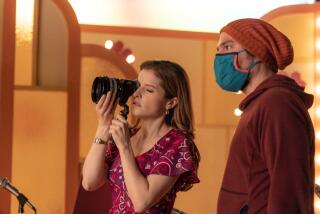‘Salesman’ Emphasizes the Despair
- Share via
“I think I’ll just go home right now and slit my wrists,” said a man at intermission, presumably a salesman. We were at the Cerritos Center for the Performing Arts, watching Hal Holbrook as Willy Loman in “Death of a Salesman,” the one play that people who never go to the theater have somehow managed to see. The man was making a valid comment on the Arthur Miller classic--after you have repeatedly seen and absorbed the perfectly balanced symbolism in this perfectly structured American tragedy, what you have is one damned depressing play.
Director Gerald Freedman gives us a letter-perfect and by-the-letter touring production, one that misses nothing but belabors a lot. Freedman puts as much emphasis on Willy’s despair over two missing elm trees (destroyed by a greedy developer) as he does on the salesman’s disintegration when finally fired by a callous boss (Bill Kux). Freedman’s “Salesman” is sure-handed if sometimes plodding; it provides no new angle on the classic, as Dustin Hoffman’s spry and whiny Willy did in the memorable 1984 version on Broadway.
But Freedman has orchestrated a fine cast, led by the chiseled Holbrook, who looks and sounds more like a crusty, old-fashioned newspaper publisher than a pathetic and self-deluded salesman. It is heartbreaking to see that patrician face tremble and then crumble in despair, or watch him preen when Willy brags of being well liked in front of his gullible boys. Holbrook creates the wrenching sight of a man swimming uphill all his life and reaching old age still saddled with the wrong values and the wrong dreams, and worse still, continuing to inflict them on his grown sons.
The Loman sons, Biff and Happy, have names that mock their seemingly carefree boyhoods. As Happy, John Speredakos is chilling as the son who is the worst of Willy--swaggering, womanizing, always capable of avoiding the truth. His protestations of love for his dad are revealed as overt hostility in the harrowing restaurant scene, when he crudely picks up two women and disowns his sad and inconvenient father.
Matt Mulhern gives a smart, measured performance as Biff, the onetime football hero who can’t get a foothold as a man. Mulhern lets you see the Biff of promise and the Biff who is once and for all crushed by his father’s expectations.
As Linda Loman, Elizabeth Franz is an effective noble sufferer, a woman who smiles when she cries. She offers endless supplies of brave smiles to boost up her husband, with whom she apparently still has a passionate relationship. But the demands of loyalty and dishonesty she places on her boys are grueling and cruel; this play is a pamphlet on how not to raise sons. It is a play from a son’s point of view.
*
Willy’s failure as a father is brought into sharp relief by Charley, the kind neighbor and successful father. David Brummel is an excellent Charley, never sanctimonious as he tries to cajole, tease or advise Willy into another way of looking at things. He’s also the character who most clearly sees Willy’s failure.
Ron Parady as Ben and Spike McClure as the young Bernard overdo the simplicity of their roles. But the cast, even down to the tiny parts of the waiter (Adam L. Koster) and the girls in the restaurant (Eve Holbrook, Kim Cozort) are well shaded. Chris Barrecca’s set is both realistic and dreamlike.
“You are the saddest, self-centeredest soul I ever did see-saw,” says the character known as the Woman (Maggie McClellan), with whom Willy has a hotel affair. Unrelentlessly depressing it may be, this “Death of a Salesman” allows us innermost access to the saddest, self-centeredest soul in American drama, a character who will continue to haunt the landscape as long as there are fathers and sons.
* “Death of a Salesman,” Cerritos Center for the Performing Arts, 12700 Center Court Drive, Cerritos, tonight-Saturday, 8 p.m.; Saturday-Sunday, 2 p.m. Ends Sunday. $28-$52. (800) 300-4345, (310) 916-8500. Running time: 3 hours.
(BEGIN TEXT OF INFOBOX / INFOGRAPHIC)
Hal Holbrook: Willy Loman
Elizabeth Franz: Linda
Matt Mulhern: Biff
John Speredakos: Happy
Spike McClure: Bernard
Maggie McClellan: The Woman
David Brummel: Charley
Ron Parady: Uncle Ben
Bill Kux: Howard Wagner
Kim Cozort: Jenny, Letta
Hugh M. Murphy: Stanley
Eve Holbrook: Miss Forsythe
Adam L. Koster: Young Waiter
An Elliot Martin production. By Arthur Miller. Directed by Gerald Freedman. Sets Chris Barrecca. Costumes Al Kohout. Lights Martin Aronstein. Sound Tom Mardikes. Original music Larry Bailey. Production stage manager Richard Costabile.
More to Read
The biggest entertainment stories
Get our big stories about Hollywood, film, television, music, arts, culture and more right in your inbox as soon as they publish.
You may occasionally receive promotional content from the Los Angeles Times.










